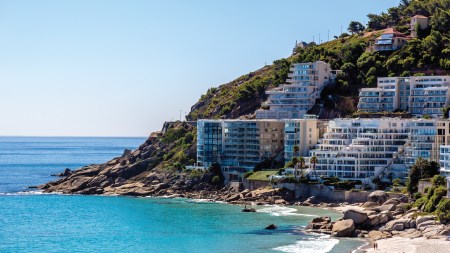The water issues in the Cape could have an effect on property sales and property transfers in the province.
Western Cape residents have literally been navigating unchartered waters this past year as the intensifying water crisis has increasingly impacted their daily lives, with the looming possibility of Day Zero a very real threat to the economy and stability of one of the world’s most popular destinations.
Consumers are bracing themselves for hefty water bills after a steep price hike in February and many home owners have already seen the value of their properties affected by costly damage caused to features like pools and gardens, but if there is a prolonged interruption of the water supply, it will also significantly impact the sale process.
This is according to Craig Guthrie, Specialist Con Attorney at Guthrie Colananni who says that a disruption in supply property will see transfers be delayed due to the City’s By-law requirements. And to exacerbate matters, disputes are likely to arise between buyers and sellers regarding the condition of the property, damage to water infrastructure and possibly misrepresentations made at the date of sale. “According to the City of Cape Town Water By-law 2010, criminal liability will be imposed on any person who transfers property without first supplying a Plumbing Certificate to the City. It further stipulates that a certificate cannot be issued unless an accredited plumber has tested the water system to ensure that the installation complies, the meter works correctly, and that there is no cross connection between potable supply and any alternative supply.
“However, the water installation cannot be checked without municipal supply so anyone considering selling their home in the near future should get a Plumbing Certificate without delay before water supply is interrupted.
“We doubt that the City will easily be in a position to exempt sellers from this requirement as there is no discretion given to the City in the Water By-law to waive compliance with section 14. Even the proposed new amendments to the Water By-law that are receiving so much attention have not catered for exemptions.”
Unfortunately, the potential pitfalls that could delay or even scupper a sale don’t end with compliance certificates.
“When concluding sales during this time of supply uncertainty, both parties and the estate agents should carefully consider the implications,” says Guthrie. “For example, whether the seller will be obliged to deliver the property on transfer a few months later in the same condition it was at the date of signing the agreement of sale. By this time, the garden and pool could be in poor condition and may even be permanently damaged, the bathrooms are no longer able to fulfil their function and the geysers may have burnt out.
“In most sale agreements this risk stays with the seller until transfer and it may be very costly for the seller if the purchaser insists that the seller fill the pool, re-establish the garden or even render the bathrooms operational to bring the property back to the condition it was at the date of sale.”
Lew Geffen, Chairman of Lew Geffen, Sotheby’s International Realty, says: “Now more than ever, it’s essential to appoint experienced agents and professionals and to pay careful attention when signing a conventional agreement of sale which often allows the purchaser to escape the agreement or sue for a reduction of the purchase price if the condition of the property deteriorates between the date of sale and transfer.
“Deal with these issues now to avoid dispute later and before the agreement is signed, both the seller and the estate agent should disclose the possibility of an interruption in water supply to potential buyers, especially those buyers who are not local and are viewing the property online. Failure to disclose this information could be a misrepresentation and result in the sale collapsing.”
However, even the darkest cloud can have a silver lining and in this very dire situation, the one ray of sunshine is that it has forced us all to be more environmentally conscious; in our personal lifestyles as well as in design, building and development practices.
Water-saving features are now becoming common installations in new homes and a brand-new Tokai development, due for launch off plan on 11 February, is the first residential estate in the city to be completely off the water grid with its own well point water supply.
Developed by Leading Edge, The Courtyard comprises four contemporary double storey family homes with spacious interiors and natural flow to private verandas and gardens. Each unit has three expansive en-suite bedrooms, an open plan living area, a study area and a double garage.
Herculene Visser, Area Specialist for Lew Geffen Sotheby’s International realty says: “We are thrilled to be marketing such a ground-breaking development and exceptional property and expect The Courtyard to attract keen interest as these homes not only offer the peace of mind afforded by a reliable water supply, they are also situated in a beautiful setting with excellent security.”
Brendan O'Brien, Chairman of the Urban Space Property Group, a forerunner in the conceptualisation and development of contemporary urban homes in Cape Town, says that the market shift towards water-efficient homes and water-wise, low maintenance outdoor areas is no longer an emergent but an established trend.
“We have also seen water saving features shoot to the top of the buyer wish list, with new homes increasingly being fitted with water saving measures, from aerated sanitary ware nozzles and spouts to rain water catch pits.
“When building new developments with multiple homes, where viable, a communal borehole can work well with water pumped to each property and from a construction perspective, many development companies like Urban Space have moved to using treated effluent.”
Nina Smith, Area Specialist for Lew Geffen Sotheby’s International Realty, says that she has seen a sharp increase in demand for properties like Cavendish Mews in Claremont.
“Since Urban Space launched the development for sale off plan in November last year, five units with rooftop terraces have already been sold.
“And we find that most purchasers, almost without exeption, now ask direct questions relating to water, and what provisions (if any) have been made regarding the availability of water. Boreholes, well points and water tanks are now very strong selling points.”
The Courtyard and Cavendish Mews are jointly marketed by Lew Geffen Sotheby’s International Realty, with prices starting at R4.65 million and R7.495m (plus VAT, no transfer duty) respectively.





